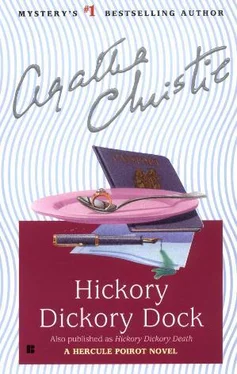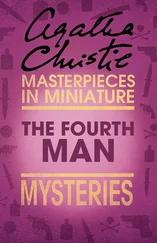Agatha Christie - Hickory Dickory Dock
Здесь есть возможность читать онлайн «Agatha Christie - Hickory Dickory Dock» — ознакомительный отрывок электронной книги совершенно бесплатно, а после прочтения отрывка купить полную версию. В некоторых случаях можно слушать аудио, скачать через торрент в формате fb2 и присутствует краткое содержание. Год выпуска: 2000, ISBN: 2000, Издательство: Berkle, Жанр: Классический детектив, на английском языке. Описание произведения, (предисловие) а так же отзывы посетителей доступны на портале библиотеки ЛибКат.
- Название:Hickory Dickory Dock
- Автор:
- Издательство:Berkle
- Жанр:
- Год:2000
- ISBN:ISBN-13: 978-0425175460
- Рейтинг книги:3 / 5. Голосов: 1
-
Избранное:Добавить в избранное
- Отзывы:
-
Ваша оценка:
- 60
- 1
- 2
- 3
- 4
- 5
Hickory Dickory Dock: краткое содержание, описание и аннотация
Предлагаем к чтению аннотацию, описание, краткое содержание или предисловие (зависит от того, что написал сам автор книги «Hickory Dickory Dock»). Если вы не нашли необходимую информацию о книге — напишите в комментариях, мы постараемся отыскать её.
Hickory Dickory Dock — читать онлайн ознакомительный отрывок
Ниже представлен текст книги, разбитый по страницам. Система сохранения места последней прочитанной страницы, позволяет с удобством читать онлайн бесплатно книгу «Hickory Dickory Dock», без необходимости каждый раз заново искать на чём Вы остановились. Поставьте закладку, и сможете в любой момент перейти на страницу, на которой закончили чтение.
Интервал:
Закладка:
"I fear so. But I consider myself personally interested-that is if you, do not object, my friend?"
"Not in the least. Why should I?"
"In my own amateurish way I shall do what I can. For me, there is, I think, only one line of action."
"And that is?" Poirot sighed.
"Conversation, my friend. Conversation and again conversation!
All the murderers I have ever come across enjoyed talking. In my opinion the strong silent man seldom commits a crime-and if he does it is simple, violent and perfectly obvious. But our clever subtle murderer-he is so pleased with himself that sooner or later he says something unfortunate and trips himself up. Talk to these people, mon cher, do not confine yourself to simple interrogation. Encourage their views, demand their help, inquire about their hunches-but, bon Dieu! I do not need to teach you your business. I remember your abilities well enough." Sharpe smiled gently.
"Yes," he said, "I've always found-well-amiability-a great help." The two men smiled at each other in mutual accord.
Sharpe rose to depart.
"I suppose every single one of them is a possible murderer," he said slowly.
"I should think so," said Poirot nonchalantly.
"Leonard Bateson, for instance, has a temper.
He could lose control. Valerie Hobhouse has brains and could plan cleverly. Nigel Chapman is the childish type that lacks proportion. There is a French girl there who might kill if enough money were involved. Patricia Lane is a maternal type and maternal types are always ruthless. The American girl, Sally Finch, is cheerful and gay, but she could play an assumed part better than most. Jean Tomlinson is very full of sweetness and righteousness, but we have all known killers who attended Sunday school with sincere devotion. The West Indian girl Elizabeth Johnston has probably the best brains of anyone in the Hostel. She has subordinated her emotional life to her brain-that is dangerous. There is a charming young African who might have motives for killing about which we could never guess. We have Colin McNabb, the psychologist. How many psychologists does one know to whom it might be said, Physician, heal thyself?"
"For heaven's sake, Poirot. You are making my head spin! Is nobody incapable of murder?"
"I have often wondered," said Hercule Poirot.
INSPECTOR SHARPE SIGHED, leaned back in his chair and rubbed his forehead with a handkerchief. He had interviewed an indignant and tearful French girl, a supercilious and uncooperative young Frenchman, a stolid and suspicious Dutchman, a voluble and aggressive Egyptian. He had exchanged a few brief remarks with two nervous young Turkish students who did not really understand what he was saying and the same went for a charming young Iraqi. None of these, he was pretty certain, had had anything to do, or could help him in any way, with the death of Celia Austin. He had dismissed them one by one with a few reassuring words and was now preparing to do the same to Mr. Akibombo.
The young West African looked at him with smiling white teeth and childlike rather plaintive eyes.
"I should like to help-yes-please," he said. "She is very nice to me, this Miss Celia. She give me once a box of Edinburgh rock-very nice confection which I do not know before. It seems very sad she should be killed. Is it blood feud, perhaps? Or is it perhaps fathers or uncles who come and kill her because they have heard false stories that she do wrong things?" Inspector Sharpe assured him that none of these things were remotely possible. The young man shook his head sadly.
"Then I do not know why it happened," he said.
"I do not see why anybody here should want to do harm to her. But you give me piece of her hair and nail clippings," he continued, "and I see if I find out by old method. Not scientific, not modern, but very much in use where I come from."
"Well, thank you, Mr. Akibombo, but I don't think that will be necessary. We-er-don't do things that way over here."
"No, sir, I quite understand. Not modern. Not Atomic Age. Not done at home now by new policemen - only old men from bush. I am sure all new methods very superior and sure to achieve complete success." Mr. Akibombo bowed politely and removed himself. Inspector Sharpe murmured to himself, "I sincerely hope we do meet with success-if only to maintain prestige." His next interview was with Nigel Chapman, who was inclined to take the conduct of the conversation into his own hands.
"This is an absolutely extraordinary business, isn't it?" he said. "Mind you, I had an idea that you were barking up the wrong tree when you insisted on suicide. I must say, it's rather gratifying to me to think that the whole thing hinges, really, on her having filled her fountain pen with my green ink. Just the one thing the murderer couldn't possibly foresee. I suppose you've given due consideration as to what can possibly be the motive for this crime?"
"I'm asking the questions, Mr. Chapman," said Inspector Sharpe drily.
"Oh, of course, of course," said Nigel, airily waving a kand. "I was trying to make a bit of a short cut of it, that was all. But I suppose we've got to go through with all the red tape as usual. Name, Nigel Chapman. Age, twenty-five. Born, I believe, in Nagasaki-it really seems a most ridiculous place. What my father and mother were doing there at the time I can't imagine. On a world tour, I suppose.
However, it doesn't make me necessarily a Japanese, I understand. I'm talking a diploma at London University in Bronze Age and Mediaeval History. Anything else you want to know?"
"What is your home address, Mr. Chapman?"
"No home address, my dear sir. I have a papa, but he and I have quarrelled, and his address is therefore no longer mine. So 26 Hickory Road and Coutts Bank, Leadenhall Street Branch, will always find me as one says to travelling acquaintances whom you hope you will never meet again." Inspector Sharpe displayed no reaction towards Nigel's airy impertinence. He had met 'nigels' before and shrewdly suspected that Nigel's impertinence masked a natural nervousness of being questioned in connection with murder.
"How well did you know Celia Austin?" he asked.
"That's really quite a difficult question. I knew her very well in the sense of seeing her practically every day, and being on quite cheerful terms with her, but actually I didn't know her at all. Of course, I wasn't in the least bit interested in her and I think she probably disapproved of me, if anything."
"Did she disapprove of you for any particular reason?"
"Well, she didn't like my sense of humour very much. Then, of course, I wasn't one of those brooding, rude young men like Colin McNabb. That kind of rudeness is really the perfect technique for attracting women."
"When was the last time you saw Celia Austin?"
"At dinner yesterday evening. We'd all given her the big hand, you know. Colin bad got up and hemmed and hahed and finally admitted, in a coy and bashful way, that they were engaged. Then we all ragged him a bit, and that was that."
"Was that at dinner or in the Common Room?"
"Oh, at dinner. Afterwards, when we went into the Common Room, Colin went off somewhere."
"And the rest of you had coffee in the Common Room."
"If you call the fluid they serve coffee-yes," said Nigel.
"Did Celia Austin have coffee?"
"Well, I suppose so. I mean, I didn't actually notice her having coffee, but she must have had it."
"You did not personally hand her her coffee, for instance?"
"How horribly suggestive all this is! When you said that and looked at me in that searching way, d'you know I felt quite certain that I had handed Celia her coffee and had filled it up with strychnine, or whatever it was. Hypnotic suggestion, I suppose, but actually, Mr. Sharpe, I didn't go near her-and to be frank, I didn't even notice her drinking coffee, and I can assure you, whether you believe me or not, that I have never had any passion for Celia myself and that the announcement of her engagement to Colin McNabb aroused no feelings of murderous revenge in me."
Читать дальшеИнтервал:
Закладка:
Похожие книги на «Hickory Dickory Dock»
Представляем Вашему вниманию похожие книги на «Hickory Dickory Dock» списком для выбора. Мы отобрали схожую по названию и смыслу литературу в надежде предоставить читателям больше вариантов отыскать новые, интересные, ещё непрочитанные произведения.
Обсуждение, отзывы о книге «Hickory Dickory Dock» и просто собственные мнения читателей. Оставьте ваши комментарии, напишите, что Вы думаете о произведении, его смысле или главных героях. Укажите что конкретно понравилось, а что нет, и почему Вы так считаете.












